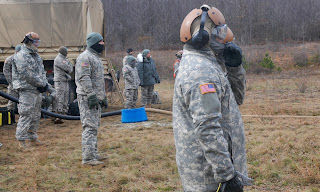Louis Armstrong Played for My Father's Soldiers at Camp Shenango, Pa.
My father, George Gussman, enlisted in the Army at the end of 1939. He was 34 years old and at the end of his career as a middleweight boxer and a pitcher for the Reading Phillies. He was the fourth of six sons of Jewish immigrants from the Russia. They arrived at the beginning of the century. My father and his older brothers only went to Boston Latin school until the 8th grade. The younger boys got all the way through high school--business was better by that time for grandpa.
Dad was a warehouseman in a bad economy and the Army was a steady job. He took a two-year enlistment which was to end in mid-December 1941. Dad was packed up to go home in the second week in December. He never left.
On December 8, 1941, all discharges were cancelled and enlistments extended for the duration of the war.
With war declared many rules changed and the Army sent George to Officer Candidate School. In 1942 he was commissioned a 2nd Lieutenant and sent to Camp Shenango, Pa., near Erie. His first command was a black company, a supply company that also repaired stoves for camps and bases across Pennsylvania.
Dad kept a scrapbook of his soldiers which I am hoping to scan and post later this year. Among those pictures is a picture of Louis Armstrong signed with a a note saying "To My Boy Guss." It is one of the many pictures my father carefully kept from his first command. Dad kept in touch with several of the soldiers he served with long after the war ended.
After more than a year in charge of the company in Shenango, Dad went to Fort Indiantown Gap where I serve now. Then as a captain, he took command of 600 Afrika Korps German prisoners in what is now the Reading Airport.
It hadn't occurred to me until today, but it is possible my sons are related to one of my Dad's soldiers. Most of his men came from Pennsylvania. My adopted sons were born in Pittsburgh and Harrisburg. It's not likely, but in a world so different from the one Dad lived in, there might be a direct connection between his first command and his son's family.







.jpg)



























